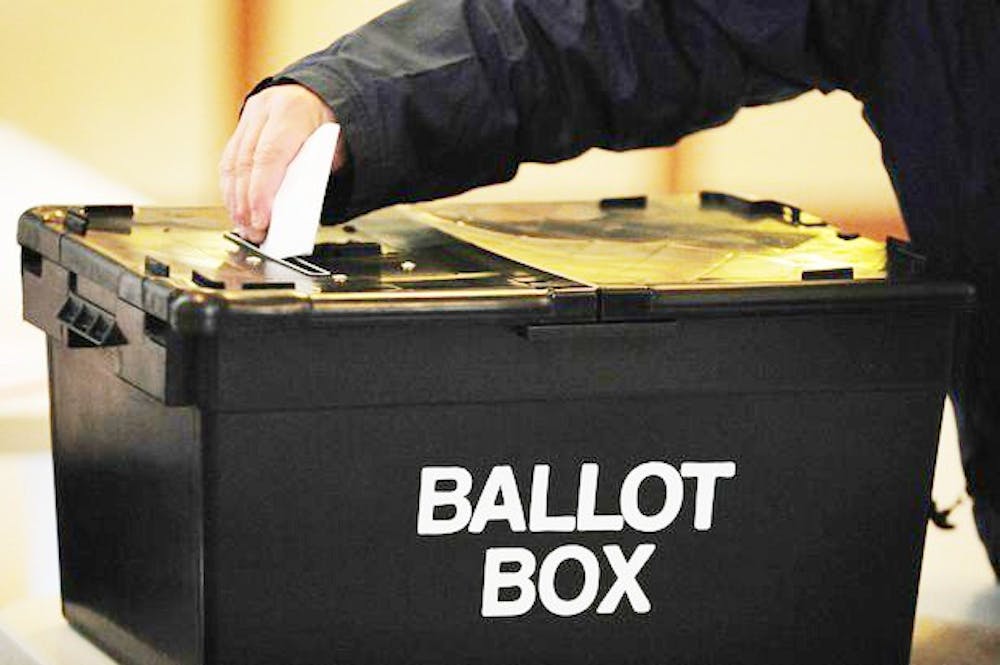Joe Friedrichsen | Echo
UPDATE: Scotland voted "no" to independence in Thursday's referendum, by a margin of 55 to 45 percent, according to The Guardian.
Scotland's voters have taken to the polls and cast their ballots in a landmark referendum that will determine whether Scotland remains part of the United Kingdom.The results of the referendum were announced early Friday morning, following The Echo's publishing deadline. Voters answered "Yes" or "No" to the referendum question: "Should Scotland be an independent country?" As of 9 p.m. EDT, the Guardian was predicting a 55 percent "No" vote and a 45 percent "Yes" vote, with five of the country's 32 councils reporting.
From the remote highlands and islands to the big cities of Edinburgh and Glasgow, CNN reported more than 4.2 million people are registered to vote. This marks Scotland's largest electorate and nearly 90 percent of voters participated, according to The Guardian. Some stations saw queues even before the polls opened at 7 a.m. local time.
On Wednesday, three different opinion polls showed Scottish unionists being 4 percentage points ahead of secessionists at 52 percent compared to 48 percent.
"It is very tight," John Curtice, professor of politics at Strathclyde University and one of Scotland's premier pollsters, told the Scotsman newspaper. "At the moment, it looks as if the 'yes' campaign is going to fall agonizingly short from their perspective. But I have always said this is the 'no' campaign's to lose, and it certainly looks as if they have got pretty close to that."
Alex Salmond, First Minister of Scotland and head of the independence movement, toldBBC Radio 4's Today program that the referendum campaign was one of the most exhilarating in Western Europe and was assuming nothing about the result.
Around the world, many countries are hoping for a "no" vote against independence from the U.K.Reuters reported that states do not want a contagious precedent of state fragmentation to be set should Scotland secede.
Spain's government warned Wednesday that fellow European Union (EU) members are not in favor of a "yes" vote on Scottish independence, reportedThe Telegraph. Spain also said a new Scottish state could not expect a quick readmission to the bloc.
Spanish Prime Minister Mariano Rajoy said any region to break away would automatically be deprived of EU benefits as well as membership. Rajoy declined to comment on whether Spain would exercise a veto on admitting an independent Scotland to the EU.
In response to a parliamentary question, Spain's foreign minister José Manuel García-Margallo said, "For Scotland, secession would be a catastrophe. It would end up in a Balkanization process that nobody in Europe wants right now."
Scotland's referendum further encouraged leaders of Catalonia (an autonomous region within Spain) to call for Madrid to allow a similar vote in November on whether the eastern region should stay in Spain. However, García-Margallo said such a move would breach the country's constitution.
Salmond, referring to Spain's opposition to automatic Scottish entry to the EU, said Scotland had 1 percent of the EU's population, but 20 percent of its fish stocks, 25 percent of renewable energy and 60 percent of oil resources,the BBC reported. Salmond also responded to critics who believe Scotland would not be welcomed into the EU should it secede. He said that his critics didn't understand Europe's acceptance of democratic results and that Scotland has much to contribute to the bloc.
The U.S. favors the U.K. remaining intact. "The U.K. is an extraordinary partner for America and a force for good in an unstable world. I hope it remains strong, robust and united," President Obama tweeted Wednesday, according to the Telegraph.




